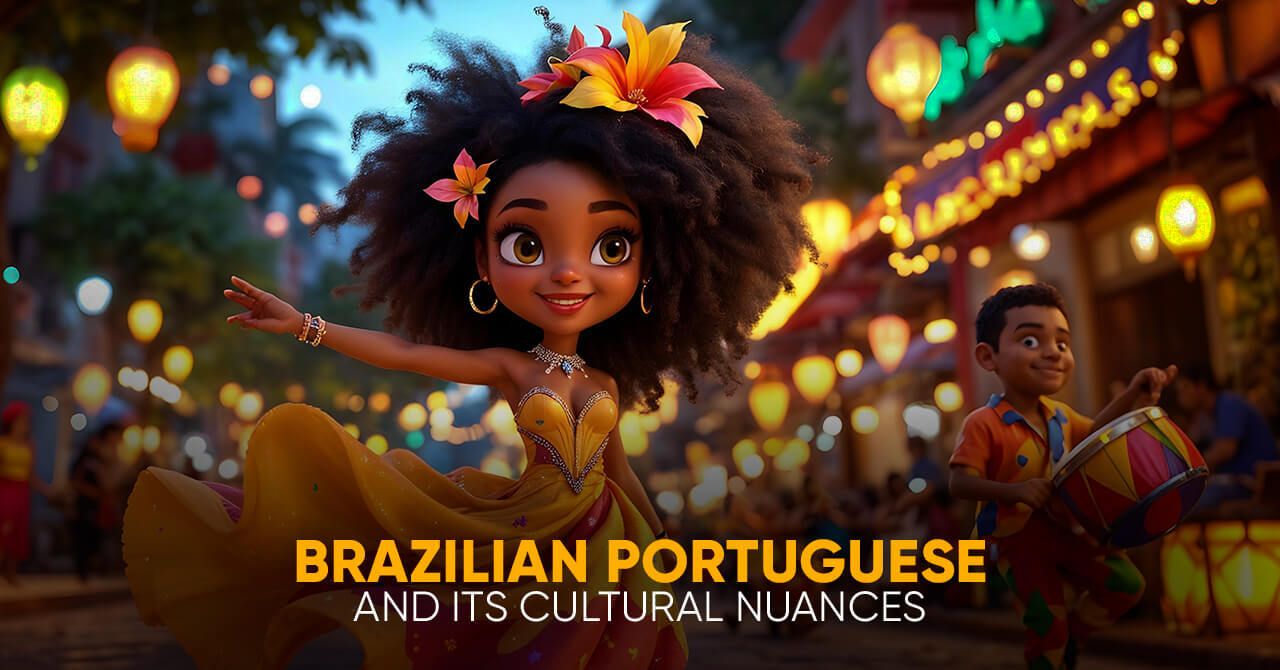
Learning Brazilian Portuguese: The Beginning of a Cultural Path
Brazil is often known for Bossa nova, beaches, and the Amazon rainforest. Those are really important things for the world’s culture and environment, but there’s a fundamental aspect of Brazil that is often not mentioned: the profoundness of its people and places. That means, in cultural, linguistic, and social expressions, as well as in amazing landscapes, Brazil translates as gratitude for living.
When I teach Brazilian Portuguese, since the first course, I try to show my students this deepness in different aspects, such as some words, ways of communicating with other people, and music. One of the main aspects that enables this context is miscegenation. The Brazilian society base is Indigenous, African, and Portuguese, which were continually mixed with new immigrants such as Italians, Germans, Japanese, Lebanese, and many others. This variety of cultures and knowledge in our society amplified a lot of our perspectives about life.
Now, I would like to introduce some of those aspects that make Brazil a unique experience that can be reached by learning the language.
Cultural aspects of Brazilian Portuguese
Spiritual paths
Brazil is one of the countries with the most diversity in terms of spirituality. Catholics and Christian churches, indigenous rituals such as ayahuasca, nature retreats, and African-Brazilian religions such as Umbanda and Candomblé are the most common. They give people the possibility of experiencing faith in a different way. Nice places to visit are the “Igreja do Bonfim” church and the Iemanjá celebration at the beach on February 2nd in Salvador Bahia. Going to an indigenous ritual is a possibility to have a deeper insight into the relationship between people and nature. All that religiosity variety expressed through Brazilian culture enables people to have faith despite the difficult paths of life.
Samba music
Samba is known for the happy music played in the Carnival. But actually, Samba has many types, not just the happy Carnie one. Some of them are: pagode, samba de roda, choro, bossa nova, samba de raiz, etc. Even though the rhythm is usually happy, the lyrics often talk about love disappointments, nostalgic feelings, and regrets. The combination of happy music with sad lyrics reveals the Brazilian way of dealing with life: a happy attitude even if we are sad. The best music that represents this is “O que é, o que é” by Gonzaguinha, a music that talks about the good and bad side of living.
E a vida, o que é, o que é?, meu irmão
É a batida de um coração
É uma doce ilusão
E a vida, ela é maravilha ou é sofrimento? É alegria ou lamento?
Diga lá, o que é meu irmão?
And life! And life, what is it?
Tell me my brother
It’s the beat of a heart
It’s a sweet illusion
And life, is it wonder or suffering? Is it joy or lamentation?
What is it, what is it, my brother?
Food
As a really mixed country, you can find a great amount of different and amazing dishes. The bases of Brazilian foods are beans, corn, and manioc/cassava. Even though there are big regional differences in the ingredients used, almost all Brazilians eat feijoada (an Afro-Brazilian bean dish) and farofa (an indigenous garnish dish with salted cassava). There are other gastronomic preciosities such as: açai, guaraná, jambu, maracujá. From its large diversity of fruits and vegetables, Brazil makes us value nature's creations by offering us a happy, nutrient-rich, and diverse meal!
Brazilian soul expressed by language
Brazilian Portuguese is less formal than Portuguese, and we could say it is more common since there are more than 200 million Brazilians. Our differences are not only in the conjugation (Portuguese people almost never conjugate with “você”) or different words but also in the use of some expressions/concepts. This can be seen in the use of the most important Portuguese word: “Saudade.” For European countries, “saudade” is a noun that means nostalgia, the feeling of sadness for someone's passing and missing, or the remembering of something that was pleasant. In Brazil, it also has these meanings, but an important extra one. In Brazil, the feeling of “saudades” also means strong gratitude for what was experienced in life. As a part of Manuel Bandeira’s poem “A maneira de Olegário Mariano” says:
Choras sem compreenderes que a saudade
É um bem maior que a felicidade.
Porque é felicidade que ficou.
You cry without understanding that “saudade”
Is a greater good than happiness
Because it is happiness that remains.
The representation of that world once more shows the profoundness of Brazil and Brazilian culture in terms of the different paths of life. If you like these explanations and are interested in learning the Brazilian Portuguese language, have a trial class with me. I promise we are going to learn a lot, have fun, and be more profound with this culture!
I am a Brazilian Portuguese and Spanish teacher, as well as an international relations analyst. My goal is to help people in their personal and collective projects through learning.

